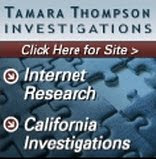One recommendation that affects debt collectors, private investigators and employment background companies is to truncate social security numbers.
Most of the identifying data about a party acquired by the courts serves the interests of others. The courts have little or no need for the data. We have recommended that the courts review the data recorded during the history of a case and determine how much is genuinely needed.
Of the identifying information that is required, the courts should make public a party’s name, address, date of birth, driver’s license number and the last four digits of a party’s social security number. This information is more than sufficient to protect against identity confusion. Admittedly, the risk of identity fraud increases. [Emphasis is mine.]
The report suggests a method for keeping the SSN out of public view but still available to the court. There's no special dispensation for individuals and businesses who need to verify identity through the social security number. Getting access to this could be burdensome for businesses, as they would probably have to get a court order.
The Utah report cites United States Department of Justice v. Reporters Committee For Freedom of the Press, to argue that aggregate personal identifiers unduly impinge on privacy interests because, 1. the parties to court actions expect that their personal information will only be used for the court's purposes and, 2. a "dossier" can be compiled from that which would only be found in individual files. But this case attends to the issues of criminal rap sheets, not other types of records which have previously been deemed public.
The social security number is the only means to associate a name with a specific individual, and to confirm this identity through name changes. It is the unique national identifier; names and dates of birth are very commonly shared but each person has her own social security number. This is our national ID card. And it's a good and proper tool to confirm background by employers, to collect on judgments, mitigate against fraud, locate people related to litigation, family matters, probate and many other legitimate purposes.




